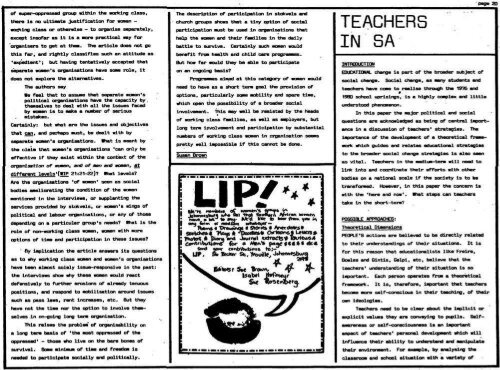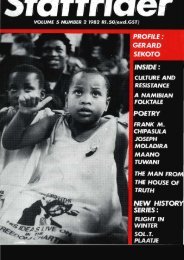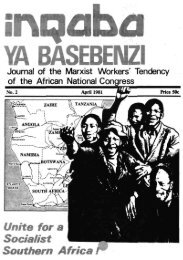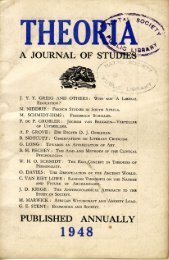Create successful ePaper yourself
Turn your PDF publications into a flip-book with our unique Google optimized e-Paper software.
of aurjer*-oppressed group within the working class,<br />
thvt Is no ultiaate Justification for ecaan -<br />
wording class or otherwise - to organise separately,<br />
axcspt insofar as it is a aora practical say for<br />
organisers to pet at thee. Tha artlcls doas not go<br />
this far, and rightly classifies such an attitude as<br />
'expedient'; but having tantatlvaly accaptsd that<br />
separate woeen*a organisations havo soaa role, it<br />
doas not explore tha alternatives.<br />
Tha authors say<br />
*e faal that to esauee that ssparata soaen*e<br />
political organisations hava tha capacity by.<br />
thaasalvas to deal alth all tha issuas faced<br />
by aoaan la to aaka a nuabar of sarious<br />
aletafcee.<br />
Cartalnly: but what are tha Issuas and objectives<br />
that can, and parhaps aust, be dealt with by<br />
saparata spawn's organisations. ihet is aesnt by<br />
tha claia that eoaen'a organisations 'can only ba<br />
affactlva if thay exist within tha context of tha<br />
organisation of aoaan, and of aan and aoaan, at<br />
different lev*l3'(eIP 21:21-??)? *het level*?<br />
Are tha organlsatlona "of aoaan* saan as social<br />
bodlas aaallorating tha condition of tha aoaan<br />
aantionad in tha intervieea, or supplanting tha<br />
aarvloas provided by atofcvels, or woaan's wings of<br />
political and labour organisations, or any of thoaa<br />
depending on a particular group's naana? What is tha<br />
rola of non aorfcing class aoaan, aaaajl with aora<br />
options of t lac and participation in thasa issuas?<br />
Ay lapllcatlon tha articla anaaars its Questions<br />
as to why aorfcing class aoaan and aoaan's organisations<br />
hava baan alaost solaly issua-rasponslvw in tha past:<br />
tha Intarvisws show why thasa aoaan would raact<br />
defensively to furthar erosions of alraady tanuous<br />
positions, and raapond to aobilisatlon around issuas<br />
such as pass laws, rant lncroanas, etc. But thay<br />
hava not tha tlaa nor tha option to lnvolva thaa<br />
salvas in on-going long twra organisation.<br />
This ralsas tha problee* of organisablllty on<br />
a long tara basis of *tha aost opprassad of tha<br />
oppressed* - thoaa aho llva on tha bars bonas of<br />
survival. Soaa alnlaua of tlaa and fraadoa la<br />
nawdad to partioipata socially and politically.<br />
The description of participation in stofcvals and<br />
church groups shows that a tiny option of social<br />
participation aust ba usad in organisations that<br />
halp tha aoaan and thair faalllas in tha daily<br />
battle to survive. Cartalnly such aoaan would<br />
benefit froa health and child cars pi'OQiuawioa.<br />
But how far would thay be abla to participate<br />
on an ongoing basis?<br />
Prugiajaasj alaed at this category of woaan would<br />
naad to hava aa a ahort tara goal tha provision of<br />
options, particularly soaa -ability and soars tlaa,<br />
which opan tha possibility of a broader social<br />
lnvolvaaant. fhia aay sail ba resisted by tha heeds<br />
of aorfcing class faedliee, as wall as eaployers, but<br />
long tara involvaasnt and participation by substantial<br />
members of worfcing class aoaan in organisation seeas<br />
pretty wall laposalbla if this cannot ba done.<br />
Susan Brown<br />
TEACHERS<br />
IN SA<br />
DCTntPUCTIW<br />
EDUCATIONAL change is part of the broader subject of<br />
social change. Social change, as aany students and<br />
teachers have coae to realise through the 1976 and<br />
1980 school uprisings, is a highly coaplax and little<br />
understood ohenoeenon*<br />
In thia paper the aajor political and social<br />
page 20<br />
questions are acknowledged as being of central laport-<br />
ance in a discussion of teachers' strategies. The<br />
importance of the devalopaant of a theoretical fraae-<br />
worfc which guides and relates educational strategies<br />
to tha broader social change strategies la also seen<br />
as vital. Teachers in tha aadiua tara will naad to<br />
link into and coordinate their efforta with other<br />
bodies on a national scale if the society Is to be<br />
trensforead. However, in this paper the concern la<br />
with tha *here and noe'. ahat steps can teachers<br />
take in the short-tsra?<br />
POSSIBLE APPWQAOCS:<br />
Theoretical Dleenslons<br />
PEOPLE'S actions are believed to be directly related<br />
to their understandings of their situations. It is<br />
for this reason that educational lata like Frelre,<br />
Bowles end Olntis, Gelpl, etc, believe that tha<br />
teachers' understanding of their situation Is so<br />
iaportant. Each parson operates froa a theoretical<br />
frwawwortc. It is, therefore, iaportant that teacher*<br />
bacoaa aora salf-conscioua in their teaching, of their<br />
own Ideologies.<br />
Teachers naad to be clear about tha lapliclt or<br />
explicit values thay are conveying to pupils. Self-<br />
awareness or sal f-consc iouansas la an iaportant<br />
aspect of teachere' personal davalqceint which will<br />
influence their ability to understand and Manipulate<br />
thair anvironaant. For exaaple, by analysing the<br />
classrooa and school situation with a variety of

















